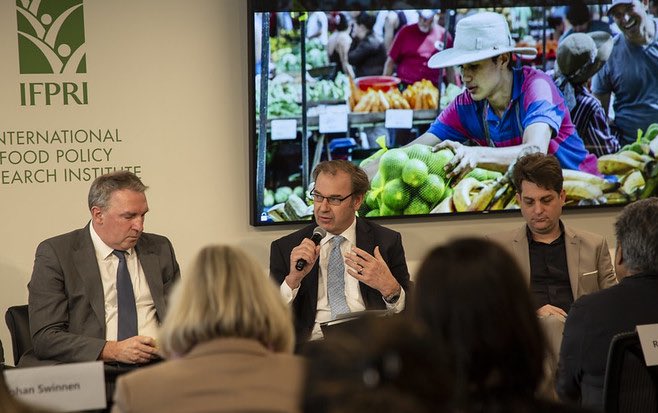The global trade conflicts of the past couple of years have created uncertainty for agriculture, and building an inclusive, efficient, sustainable international trade system is more important than ever. A Jan. 30 IFPRI policy seminar—jointly organized with the German Embassy to the United States and moderated by IFPRI Senior Research Coordinator Valeria Piñeiro—explored insights into the challenges of promoting trade, food security, and nutrition from the 2020 Global Forum for Food and Agriculture (GFFA) event in Berlin two weeks earlier.
“GFFA is a unique international conference, and the world’s largest gathering of agricultural ministers to discuss issues of vital and strategic importance for the future of agriculture,” Friedrich Wacker, Director-General of the German Ministry of Food and Agriculture, said in a video message. The conference convened with 71 government ministers, 12 international organizations, and over 2,000 visitors from 110 countries from politics, science, civil society and private sector.
The GFFA communique lays out these key messages:
- Trade plays a crucial role in achieving global food security, fighting malnutrition, diversifying food supply, and compensating food supply deficits.
- Trade can be a major driving force for economic development by contributing to prosperity and employment.
- Trade promotes political and economic stability.
Wacker listed some crucial prerequisites that must be fulfilled to realize these benefits, including global rules and value-based standards to ensure fair trade; inclusive value chains that provide access to markets for women and smallholders; special attention to the needs of developing countries; and development of sustainable value chains with international standards.
The GFFA offered a number of specific proposals and solutions, including a set of rules for global markets and the World Trade Organization (WTO) as the central institution; strengthening local, regional and global value chains for a more equitable distribution of welfare; promoting technical and organizational innovations; empowering women to access markets; and continued implementation of environmental measures in agricultural trade.
In a roundtable discussion, panelists addressed questions on trade, food security, and sustainability.
Question 1: What is the role of trade in the pursuit of global food security and nutrition, today and tomorrow?
“With an estimated 9.8 billion people to support on the planet by 2050 and to achieve SDG2 by 2030, we need to sustainably produce an increasing amount of safe and affordable food,” said German Agricultural Attaché Markus Brill. Trade plays a central role in the development of prosperity and in reducing poverty, he said, by generating employment and in mitigating and reducing price volatility.
“The growing population and the distribution of natural resources do not match, and we need to achieve a balance,” said IFPRI Senior Research Fellow David Laborde. In addition, he said, trade supports nutrition diversity and provides stability during market or climate shocks.
Question 2: How can regional and global value chains be made more inclusive and sustainable?
“For global value chains to be more inclusive and sustainable, they need to exist first,” said IFPRI Director General Johan Swinnen. That means investing in building up value chains in impoverished rural areas where infrastructure, markets, and services are absent or weak.
Martien van Nieuwkoop, World Bank Global Director for Agriculture and Food Global Practice, shared four pathways to address these challenges: Investments from governments and private sector to resolve constraints faced by smallholders such as access to finance; incentives to farmers to invest in sustainable technologies; universal application of the principles of responsible agricultural investment; and unlock the potential of information and communications technologies for transparency and traceability, and in reducing market transaction costs for farmers by establishing e-marketing platforms.
Question 3: What are the regional public goods and institutions that governments and donors need to invest in to ensure that trade contributes to food security objectives?
“Investment requirements are different in different countries,” said Swinnen. Today, most countries underinvest in agricultural innovation and need to step up research and extension efforts to increase productivity, while also reducing carbon footprints. Investing in regional institutions and public goods with the support of the public sector can help achieve economies of scale and network effects. In addition, there is a need for reforming of and investment in food safety systems. Furthermore, developing countries confront constraints in the high cost of trading and deficient trade infrastructure, and non-tariff trade barriers. IFPRI’s Africa Agriculture Trade Monitor provides insights from the continent in this regard.
Question 4: Moving towards the 12th WTO Ministerial Conference in June in Nur-Sultan, Kazakhstan, what are the important topics that will contribute to a sustainable global food system?
The global food system is under pressure due to prevalence of trade distorting subsidies in some countries and the WTO has made limited progress in recent years, panelists noted. On the other hand, “most countries need to properly spend in agriculture instead of creating negative externalities or shift the problem to the neighboring country,” Laborde said.
Future challenges include the “reorganization of WTO’s dispute settlement body; reducing the complexity of trade processes such as the hidden costs in the trade of perishable products, and reforming farm support and subsidies,” concluded Laborde.
Swati Malhotra is a Communications Specialist with IFPRI’s Markets, Trade, and Institutions Division.







